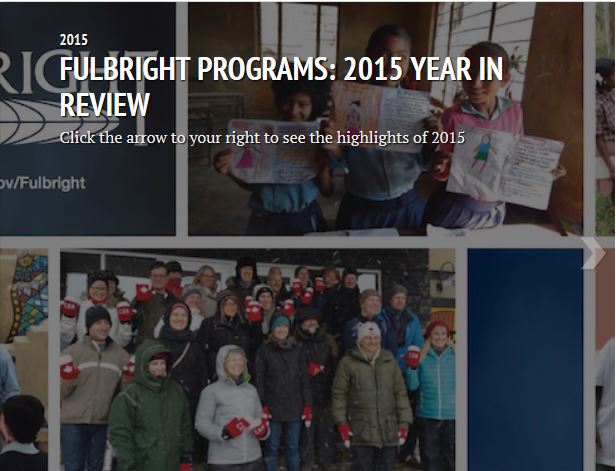
Jonathan Remple, 2010-2011, Fulbright English Teaching Assistant to Rwanda, at the base of the Virunga Volcano Range in Musanze, Rwanda
Before college, I never would have imagined that I would someday become a Fulbright English Teaching Assistant. I knew the highly competitive nature of the Fulbright Program, and was initially intimidated, but its central focus on cultural exchange meshed well with my aspirations and compelled me to apply. Once in college, I reached out to my on-campus Fulbright Program Adviser, who was extremely encouraging and helpful in guiding me successfully through the process. After a fantastic year of learning in Rwanda, I’m grateful I did so.
My Fulbright experience was particularly unique because the U.S. Department of State partnered with Peace Corps, allowing me to train for six weeks alongside Peace Corps Volunteers in rigorous language instruction, cultural immersion courses, and teaching methods. From the onset of the program, my goal was to live as close to the earth and the community as possible, focusing my efforts on cultural awareness and exchange. For me, nothing meant more than embracing Rwanda’s native tongue, Kinyarwanda.
Based at I.S.A.E. – Busogo, an agricultural and horticultural university some 12 miles or so between the Democratic Republic of the Congo and Uganda, my apartment rested at the base of five volcanoes where wild gorillas famously reside. Three to four times per week, I gave four-hour long English courses to between 50 and 60 students one to two times a day. Having never taught so many students in a single class, my learning curve was steep. However, by splitting classes into smaller sections and conducting teacher trainings on how to engage student participation instead of relying on the rote memorization methods of the French system, the daunting became achievable and rewarding.

Jonathan Remple, 2010-2011, Fulbright English Teaching Assistant to Rwanda, speaking with local children on a tour of Gakenke Valley
When not teaching, I devoted my time to a host of on-campus activities like volunteering with student groups and interviewing HIV-positive micro-finance entrepreneurs. But my main focus was the study of Kinyarwanda poetry, oral history, and folklore. After exhausting our small library’s resources, I began traveling to the National University of Rwanda, some seven hours away in Butare, to examine their archives. In translating these texts from French and Kinyarwanda to English, I began appreciating a hidden history of Rwanda, one whose center revolved not around the genocide, but instead around a rich Bantu language. I was floored by this language, whose tales of Kings and Earth’s beginnings flowed in alliterative sentences spindled and bent like contemplative musical riffs.
I memorized and began to use these new phrases in my daily conversation, inspiring looks of pure amazement from my colleagues that a muzungu (foreigner) was speaking them. It was then, some three months in, when my colleagues became friends.
“Ah! Now you know this language, you truly care about Rwanda,” became a commonly heard and much appreciated phrase to my ears.
It was also then that true cross-cultural exchange began, not simply by informing them about my country, but in first demonstrating my passion for theirs. In focusing on listening, when the time came to speak about my experiences and country, my words carried more weight. By not relying solely on English or French, my experience in Rwanda became a cultural education, groundwork for true exchange, and a cherished time in my life.
My advice for prospective Fulbrighters is:
- Research your host country. In your application, identify why you have to be in this particular country.
- Connect with your on-campus Fulbright Program Adviser six months to one year before you plan to apply.
- Upon arrival in your host country, learn to listen before you learn to speak, and learn to speak well. Everyone has a faculty for language. Find your strengths and repeat key sentences and phrases as much as possible. My first week I struggled with learning a word per week. Pay for a language tutor for your first month if need be. You’ll be glad you did!
Have a question about Jonathan’s Fulbright experience or the Fulbright English Teaching Assistantship Program? Email him at JRemple.AlumniAmbassador@fulbrightmail.org.


No Comments